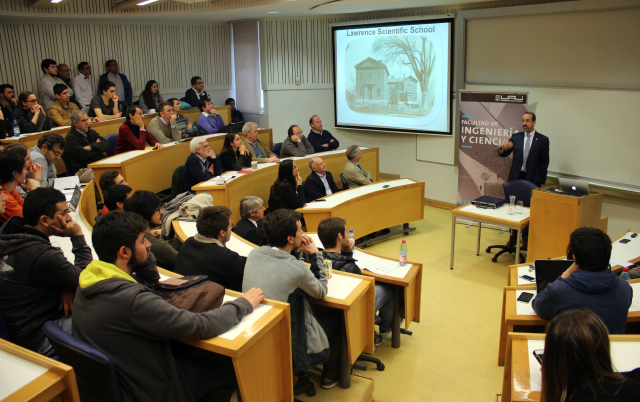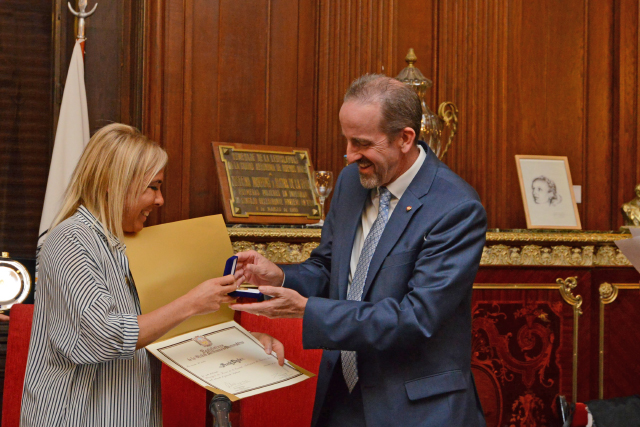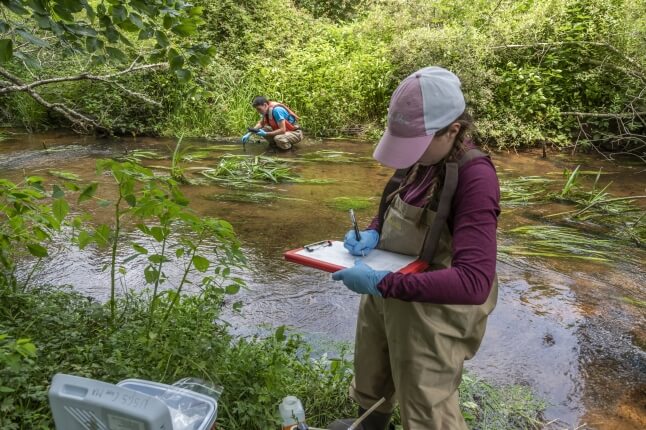News
Harvard John A. Paulson School of Engineering and Applied Sciences Dean Frank Doyle (center) stands with Universidad Adolfo Ibáñez Rector Andrés Benítez (left) and Alejandro Jadresic, Dean of the College of Engineering and Sciences.
Solving important societal challenges requires an innovative approach that is multidisciplinary, and also multinational.
That is one key message Francis J. Doyle III, Dean of the Harvard John A. Paulson School of Engineering and Applied Sciences (SEAS), shared with business executives, educational leaders, and government officials during a recent trip to two South American capitals.
While meeting with deans and faculty members of Universidad Adolfo Ibáñez and other universities in Santiago, Chile, Doyle spoke about the dramatic growth of engineering and applied sciences at Harvard and discussed the potential for research collaborations. A particular highlight of those visits was the chance to meet with young faculty who had completed Ph.D. studies or postdoctoral work with SEAS faculty.
“It is amazing to see the global impact of Harvard’s training in engineering and applied sciences,” Doyle remarked.

Doyle presents to faculty members at the Universidad Adolfo Ibáñez in Santiago, Chile.
The meetings also focused on opportunities to launch new student exchange programs. Current SEAS field programs at the Universidade de São Paulo in Brazil and the Universidad de Ingeniería Y Tecnología in Peru challenge students to develop collaborative solutions for environmental problems in Latin America.
“Transporting students to a different cultural context and physical location gives them the opportunity to imagine things in a new way and come up with different solutions to problems,” said Brian Farrell, Director of the David Rockefeller Center for Latin American Studies (DRCLAS), and Professor of Organismic and Evolutionary Biology. “For instance, our students could learn how engineers tackle problems in parts of the world where availability of resources is much different than what we know in the U.S.”
In meetings organized by the DRCLAS Regional Office in Santiago and in collaboration with Equitas Capital, Doyle also spoke with business leaders and government representatives to build relationships with institutions in the private and public sectors, and to strengthen existing Harvard connections in the region.
Doyle also visited neighboring Argentina during his trip, where he shared the vision of SEAS with several groups of Harvard alumni, among the more than 4,300 graduates living in South America. Doyle discussed the collaborative nature of SEAS and also spoke about the school’s focus on innovation and entrepreneurship during a breakfast with CEOs and a luncheon with young entrepreneurs in Buenos Aires, which were facilitated through the Harvard Business School’s Latin American Research Center.
“Technology companies and venture capital firms are booming in Latin America, and a number of Harvard alumni work in these sectors,” said Center Director Fernanda Miguel. “Dean Doyle was able to create excitement about the potential for collaboration, but also emphasize the ideals of the One Harvard campaign, which seeks to expand the university’s impact throughout the world.”
The global impact of technological innovation was a theme of the Institute of Electrical and Electronics Engineers (IEEE) Multi-Conference on Systems and Control in Buenos Aires, where Doyle and colleagues ran an educational workshop on the artificial pancreas, an automated system to regulate blood sugar levels of individuals with type 1 diabetes mellitus.
Doyle and collaborators Daniel Chernavvsky, an Argentinian native and Assistant Professor of Research at the University of Virginia Center for Diabetes Technology, and Claudio Cobelli, Professor in the Department of Information Engineering at the University of Padova in Italy, received the prestigious “Huéspedes de Honor de la Ciudad” (guests of honor) recognition for their work to reduce the impact of diabetes from Argentinian Congresswoman Claudia Canciano.
“I came back from this trip energized with ideas for collaborative SEAS partnerships with companies and universities in Argentina and Chile. These include curricular initiatives, internship opportunities, and specific engineering and applied sciences projects. And, of course, a wonderful highlight was receiving the recognition from the Buenos Aires Legislature for our work on diabetes,” Doyle said.

Doyle receives the Huéspedes de Honor de la Ciudad recognition from Argentinian Congresswoman Claudia Canciano at the Palace of the Argentine National Congress in Buenos Aires.
Topics: Environment
Cutting-edge science delivered direct to your inbox.
Join the Harvard SEAS mailing list.
Press Contact
Adam Zewe | 617-496-5878 | azewe@seas.harvard.edu



